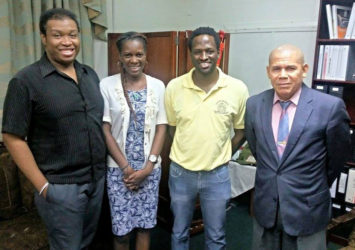Full implementation of Comprehensive Sexuality Education (CSE) in the school system is one of the issues that the Guyana Equality Forum (GEF) wants the government here to advocate for at the UN High Level Meeting on HIV which began yesterday in New York.
On Monday, representatives from the Society Against Sexual Orientation Discrimination (SASOD), on behalf of the Guyana Equality Forum (GEF), met with the Minister of Public Health, Dr. George Norton on the issues they wanted addressed at the forum, a release yesterday from SASOD said.

The GEF representatives attending the meeting are Miriam Edwards of the Guyana Sex Work Coalition (GSWC) and the Caribbean Sex Workers Coalition (CSWC), Devanand Milton of Guyana Trans United (GTU) and John Quelch of SASOD.
The release said that SASOD’s Managing Director, Joel Simpson, Projects Coordinator, John Quelch and Advocacy and Communications Officer Schemel Patrick, attended the meeting with Norton to discuss the opportunities offered by the forum for setting bold targets for HIV prevention, treatment, care and support, human rights and the legal framework, young people, women and girls, key populations, financing and investment.
Quelch, the release said, in emphasising the groups’ points stated that key populations – specifically, men who have sex with men, transgender people and sex workers – are denied equal access to HIV prevention and healthcare services because of the structural barriers that exist in the public health system in Guyana. Quelch added that the punitive laws and policies that criminalise and discriminate against these marginalised groups impede proper HIV prevention and treatment, and effective care and support services.
Quelch said that the GEF is also advocating for the relevant decision-makers to recognise the importance of the involvement of key populations and People Living with HIV (PLHIV), in programme development and implementation at the national level.
Quelch also underlined the need for the full implementation of CSE in the school system, so that young people and children are informed on issues of their sexual and reproductive health and rights and thereby equipped to make informed decisions. Young people, especially between the ages of 15 to 24, account for more than one-third of the cases of new HIV infections, Quelch stated.





